Program AHON
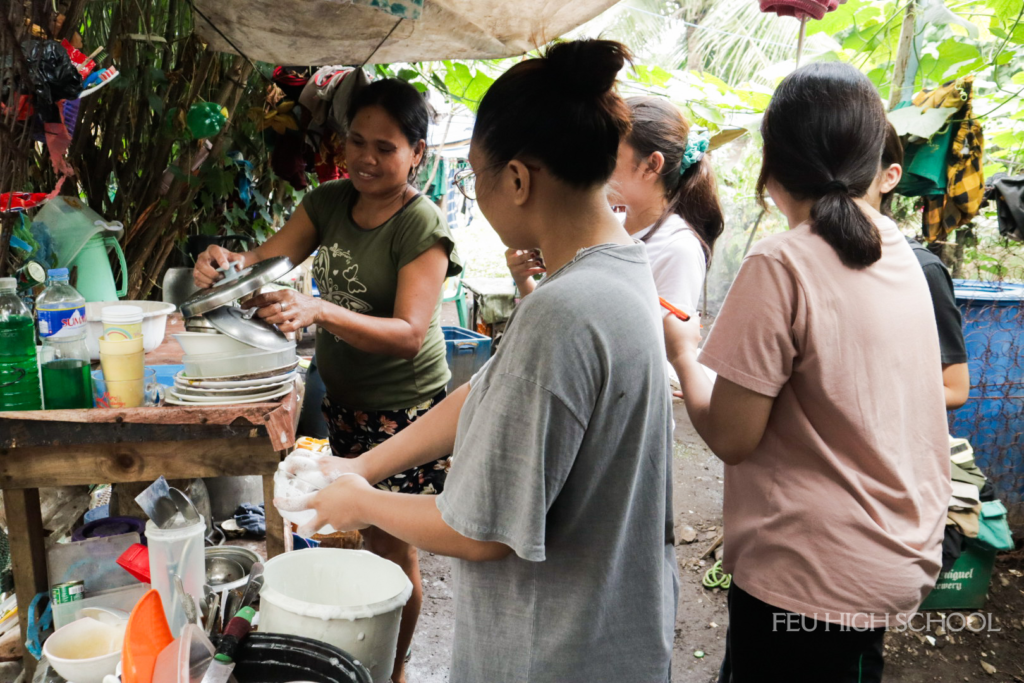
Program Ahon is a collaborative initiative aimed at uplifting families in Barangay 128, Tondo, Manila, with a specific focus on communities such as Paradise Heights and Upper Smokey Mountain. Developed in partnership with the local government of Barangay 128 and Gawad Kalinga Paradise Heights, Program Ahon encompasses a range of projects designed to address the multifaceted challenges faced by the community, including poverty and social issues.
Through various interventions, Program Ahon seeks to improve the quality of life for residents by providing essential services, opportunities for economic empowerment, and holistic community development. Projects under Program Ahon may include initiatives such as skills training programs, livelihood support, access to education and healthcare services, infrastructure development, and community empowerment activities.
By fostering partnerships between government agencies, non-governmental organizations, and local community members, Program Ahon aims to create sustainable solutions that address the root causes of poverty and inequality in Barangay 128, Paradise Heights, Upper Smokey Mountain, and similar underserved communities. Through collective effort and commitment, Program Ahon endeavors to build a brighter and more inclusive future for all residents, promoting dignity, resilience, and social justice.
Community Profile
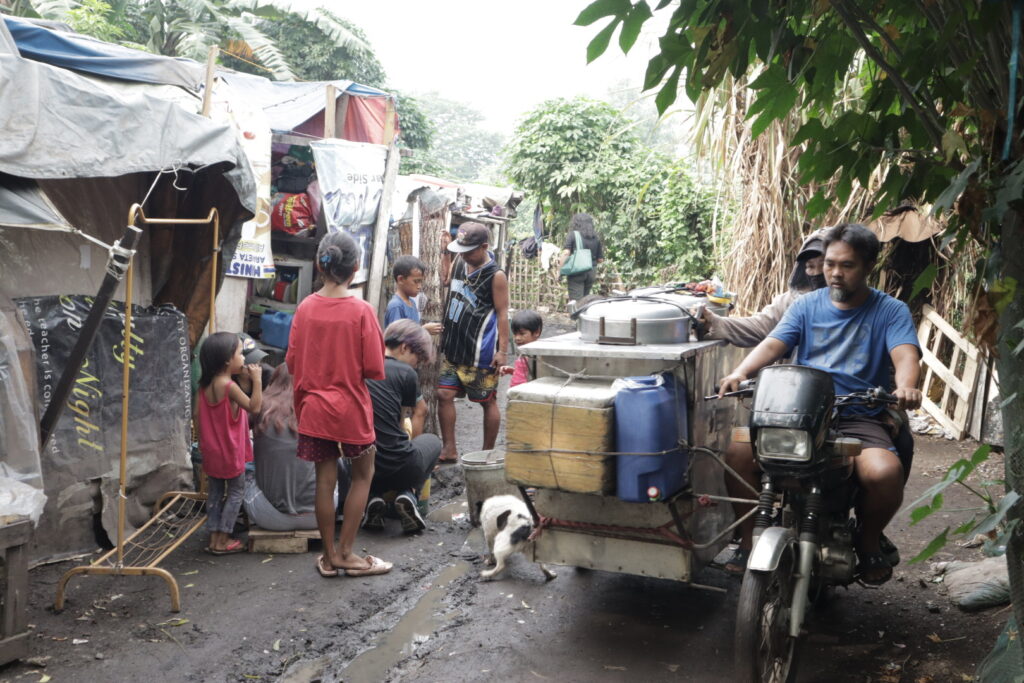
Barangay 128 is one of the many barangays (neighborhoods) situated within the district of Tondo in the city of Manila, Philippines. Tondo is known for its dense population and urban challenges, including poverty and informal settlements. It likely shares similar characteristics with other areas in
Tondo, characterized by a mix of residential and commercial establishments, narrow streets, and a vibrant but often underserved community. Residents may engage in various livelihood activities, including informal trading, small-scale entrepreneurship, and wage labor. Access to basic services such as education, healthcare, and infrastructure might be limited or uneven in Barangay 128, particularly in informal settlements. However, the community is likely resilient and tightly knit, with residents relying on social networks and community support to navigate daily life challenges.
Part of Barangay 128 is the community called Paradise Heights. It is composed of 21 buildings housing informal settlers who used to live in a mountain of trash called the Smokey Mountain, the former primary garbage dump of Metro Manila which is currently undergoing a dumpsite rehabilitation. It is situated 6.1 kilometers away from Far Eastern University – Manila Campus. Despite the offer from the government , some of the families opt to stay on the same area which is now called as the Upper Smokey.
The Upper Smokey belongs to Barangay 128, 500 meters away from their Barangay Hall. It can be reached by PUJ’s or motorcycle by hire. The road going to Paradise Heights is cemented but the road from the lower part of the mountain going up to the Upper Smokey is not cemented but passable. Cellphone signal is not an issue in Upper Smokey but if you’re in lower part of the mountain, Smart is more stable compared to other networks. Most of the houses in Upper Smokey have electricity. Filipino is the official language in the area. They spend their free time in their homes, farming or gardening, and hanging out in the sari-sari store chatting with friends. The greatest challenge here is the presence of livelihood opportunities, accessibility of water supply, and food scarcity. Most of the residents still derive their income from garbage scavenging in another dump site just a stone’s throw away.
About the Program’s Partners
1. Local Government of Barangay 128, Tondo, Manila
Barangay 128 is governed by a Barangay Council composed of elected officials who serve as representatives of the community. The local government of Barangay 128 operates within the framework set by the Local Government Code of the Philippines, which grants barangays significant autonomy in managing their affairs and delivering basic services to residents.
Typically, the Barangay Council consists of a Barangay Chairperson who serves as the highest-ranking official, along with several Barangay Kagawads who assist in legislative functions. These officials are elected through democratic processes and serve a term of three years.
The Barangay Council of Barangay 128 is responsible for various functions essential to the community’s welfare, including:
- Policy Making: The Barangay Council formulates and enacts policies, ordinances, and resolutions that address the needs and concerns of residents. These policies may cover areas such as peace and order, sanitation, infrastructure development, and social services.
- Service Delivery: The local government ensures the provision of basic services to residents, such as health care, education, sanitation, and public safety. This involves managing barangay health centers, day care centers, and other facilities, as well as coordinating with higher levels of government for additional support when necessary.
- Community Development: Barangay officials work towards the overall development of the community by implementing projects and programs aimed at improving residents’ quality of life. This may involve initiatives related to livelihood support, skills training, infrastructure development, and environmental protection.
- Conflict Resolution: The Barangay Council plays a crucial role in mediating disputes and maintaining peace and order within the community. This includes resolving conflicts between residents, enforcing local ordinances, and coordinating with law enforcement agencies when necessary.
- Participatory Governance: The local government of Barangay 128 encourages community participation and engagement in decision-making processes. This may involve conducting consultations, organizing barangay assemblies, and collaborating with local organizations and stakeholders to address shared concerns.
2. Gawad Kalinga Paradise Heights
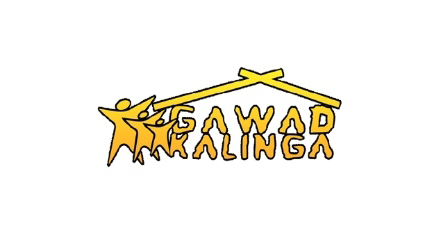
Gawad Kalinga (GK) is a Philippine-based movement that aims to alleviate poverty and build sustainable communities across the country. One of its projects, Gawad Kalinga Paradise Heights, specifically focuses on uplifting the community in Tondo, Manila.
Mission and Vision
Gawad Kalinga Paradise Heights shares Gawad Kalinga’s overarching mission of ending poverty and building communities founded on love, dignity, and solidarity. It envisions a future where residents of Tondo, Manila, particularly those living in Paradise Heights, experience holistic development and improved quality of life.
Location
Paradise Heights is situated within Barangay 128 in Tondo, Manila, Philippines. It is an area characterized by poverty, informal settlements, and various social challenges.
Objectives
The primary objective of Gawad Kalinga Paradise Heights is to address the root causes of poverty and social injustice in the community by implementing comprehensive development programs. These programs aim to provide residents with access to basic services, livelihood opportunities, education, healthcare, and community empowerment initiatives.
Community Empowerment
Central to Gawad Kalinga’s approach is the empowerment of communities to become agents of their own development. Through capacity-building activities, leadership training, and participatory decision-making processes, residents of Paradise Heights are actively involved in shaping and implementing development projects that address their needs and aspirations.
Projects under Program AHON
I. Luntiang Payaman
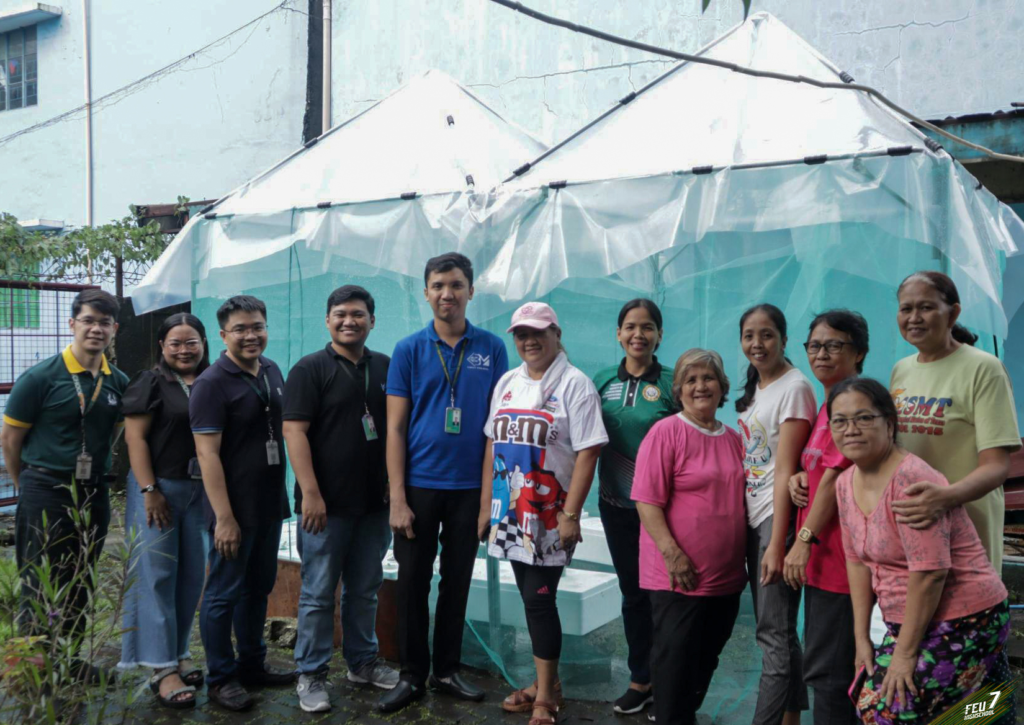
Project Luntiang Payaman is an initiative led by Grade 12 ABM students of FEU High School, aimed at empowering volunteers of Gawad Kalinga Paradise Heights with financial literacy and sustainable agricultural practices. In a collaborative effort, the students conducted an informative session to educate volunteers on the principles of financial management and the innovative technique of hydroponic farming.
During the session, volunteers learned practical skills for managing finances effectively and were introduced to the concept of hydroponics—a soil-less method of cultivating crops using nutrient-rich water. Understanding the potential of hydroponics as a sustainable source of income, the students generously donated the necessary materials and seedlings to kickstart the volunteers’ own hydroponics garden.
The primary objective of Project Luntiang Payaman is to equip Gawad Kalinga Paradise Heights with a sustainable source of funds to support their programs, particularly their feeding initiatives. To achieve this, the crops grown in the hydroponics garden are carefully selected for their high market value, including varieties such as lettuce and basil.
Through this innovative and community-driven project, the students of FEU High School aim to foster self-reliance and economic empowerment within Gawad Kalinga Paradise Heights, ultimately contributing to the long-term sustainability of their programs and the overall well-being of the community.
II. Akbay
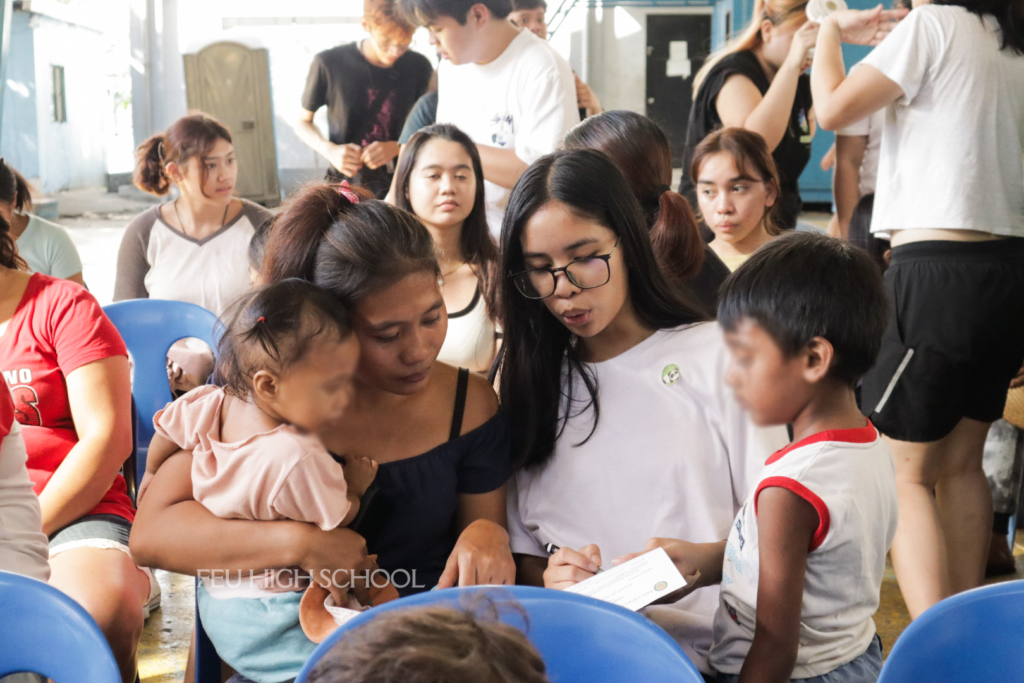
As part of Grade 12 HUMSS students (ages from 16 – 18 years old) social formation program, this project aims to provide students with an opportunity to actualize and deepen their classroom learning through a one-day exposure in some basic sectors of society. Through this experience, we seek to foster a deeper appreciation of what they have, cultivating a sense of simplicity and genuine respect for other people. We also hope that this experience shall help them truly understand the current pressing social issues to further spark their strong desires to be more proactive in nation building.
The project has three (3) phases: community experience, public hearing, and implementation of legacy project. In the 1st phase, a group of three students will spend a day with a family in the community to assist them in their daily routines, engage in meaningful conversations to learn about their family’s situation, and gain insights into the issues affecting their Barangay. At the next phase, students will propose their own project for the community based on their experience and will be consulted with the Gawad Kalinga and Barangay Leaders. Finally, they will implement their project in the community once approved.

- Rm 208, Nursing Building, Nicanor Reyes Street, 1015 Manila, Philippines
- Tel No: (+632) 8-849-4000 loc. 802 (trunkline)
- info@feuhighschool.edu.ph
Copyright © 2019. All Rights Reserved